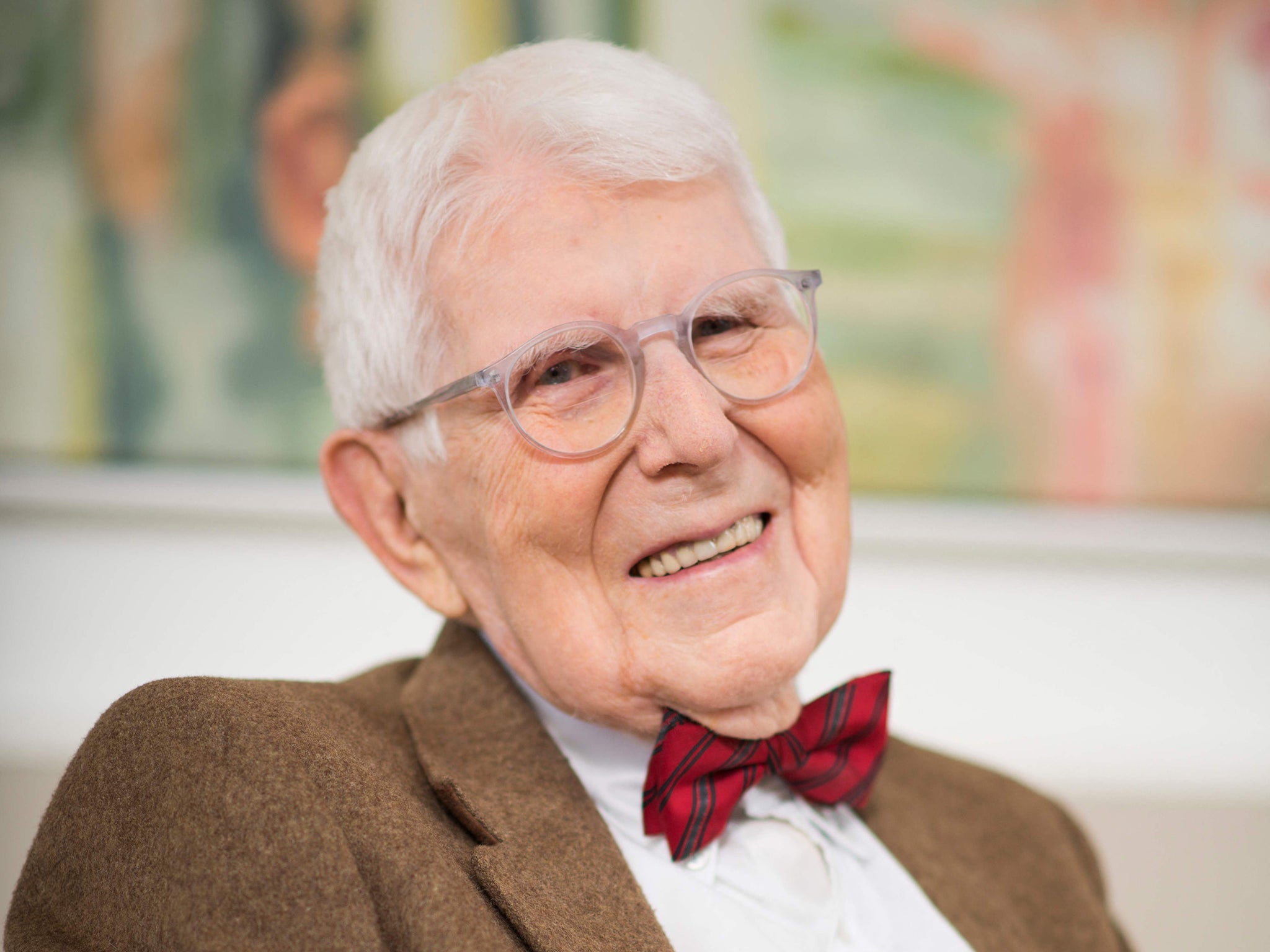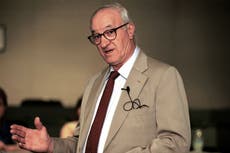Aaron Beck: Psychiatrist who developed cognitive therapy
One of the most influential psychotherapists of all time, he revolutionised treatment for depression

Aaron T Beck, who revolutionised the field of psychiatry and defied the norms of Freudian psychoanalysis by developing a pragmatic approach called cognitive behaviour therapy, which addresses a patient’s fears and insecurities through counselling and practical assignments, has died aged 100.
Early in his medical career, Beck worked as a psychiatric resident in military hospitals and other clinical settings, and underwent two years of Freudian analysis as part of his training. When he tried to find empirical evidence to support the classical model of psychoanalysis, developed by Sigmund Freud, he came up empty.
The problems Beck saw in patients he was treating for depression were not solved by the Freudian emphasis on repressed sexual desires, inwardly directed hostility or dream interpretations. Moreover, the endless talk therapy of psychoanalysis, in which patients explore their feelings about childhood, seemed to lead nowhere – except to years of expensive sessions with a psychiatrist.
By 1959, Beck had dispensed with the piece of furniture most identified with a psychiatrist's office: the couch.
“The idea was that if you sat back and listened and said ‘Ah-ha’, somehow secrets would come out,” Beck told The New York Times in 2000. “And you would get exhausted just from the helplessness of it.”
Over the next few decades, Beck refined his research and therapy techniques until, by the 1990s, cognitive behaviour therapy (CBT) had become the most widely used form of therapy for the treatment of depression and numerous other disorders. American Psychologist, the journal of the American Psychological Association, named Beck “one of the five most influential psychotherapists of all time”.
“Dr Beck’s contributions to behavioural health have been monumental,” Arthur C Evans Jr, the association’s chief executive, said in a statement. He “transformed the field, and his work brought hope and healing to countless people with clinical depression, anxiety, schizophrenia and other mental health and substance use disorders”.
After his early experience with traditional Freudian psychoanalysis, Beck searched for experimental proof of its efficacy. He first examined the notion of whether dreams were a direct reflection of a patient's unconscious desires.
“In his writings on depression, Freud said that the depressed individual ‘for the first time sees himself as he really is,’ ” Beck told The Times in 1981.
If true, Beck observed, depressed people should not derive joy from successfully completing a task. But he found that their self-esteem was boosted by performing well on assigned tasks. This insight led to a key element of cognitive therapy: depressed people believed they were failures because of distorted and negative perceptions of reality. Even their dreams were about suffering and humiliation. Beck called those feelings “automatic thoughts”, which led to lingering fears, self-doubt and hopelessness.
“Most psychological problems centre on incorrectly appraising life’s stresses, reasoning on the basis of false assumptions and jumping to self-defeating conclusions,” Beck told People magazine in 1986. “You help patients apply reason and logic to their problems so they can confront them consciously, here and now.”
By 1961, Beck had formulated the basic ideas of cognitive therapy. He also devised several measurements that became widely used to assess the symptoms of various mental disorders and the risk of suicide: the Beck Depression Inventory, the Beck Anxiety Inventory and the Beck Hopelessness Scale. (The Beck Depression Inventory was name-checked on the sitcom Frasier, which featured a psychiatrist as its central character.)
Beck’s therapeutic model was based on calm listening, focused questions and practical homework assignments, which gave patients an active role in their treatment. Simple exercises such as deep breathing lessons proved effective in alleviating deep-seated anxieties, including the fear of flying or of public speaking. In most cases, patients saw dramatic improvements in their behaviour and self-image in 12 to 16 sessions.
Beck joked that he could have cured the panic attacks of fictional mob boss Tony Soprano – who was often shown in psychoanalysis in the HBO series The Sopranos – in two sessions.
Despite writing more than 20 books, including authoritative studies of depression and its treatment, Beck found himself something of a pariah in his profession for years. He had such a hard time publishing scholarly work that he founded a new journal, Cognitive Therapy and Research. When he delivered papers at conferences, some audience members walked out.
“They said it was superficial, like treating meningitis with mood music,” Beck said of his detractors.
Other behavioural psychotherapists, including psychologist Albert Ellis, were also challenging Freudian orthodoxy in a battle that went on for years. In the 1980s, as more psychiatrists turned to pharmaceutical treatments for psychological disorders, Beck pointed to multiple studies showing that cognitive behaviour therapy was at least as helpful as Prozac, Zoloft and other mood-altering drugs.
“People who receive psychotherapy learn something,” he said. “People on drugs don't.”
Although some psychotherapists still question Beck's approach, cognitive therapy began to be more widely accepted after 1980. At the University of Pennsylvania, where Beck taught for many years, he trained generations of psychotherapists in his methods. Through the Beck Institute, which he established in 1994 with his daughter, psychologist Judith S Beck, he helped train tens of thousands of therapists in more than 100 countries around the world.
“His work changed the paradigm – how we do things, how we think about things,” A John Rush, a psychiatrist who trained under Beck, told the Philadelphia Inquirer in 2008. “Somebody like him comes along every 50, 100 years. We're talking about a rare bird.”
Aaron Temkin Beck was born on 18 July 1921, in the city of Providence in the US state of Rhode Island. Both of his parents were Jewish immigrants from Russia. His father was a printer, and his mother was a seamstress and store clerk.
Beck, who was known to friends as “Tim”, developed a severe infection from a broken arm when he was about eight. During a long convalescence, he became a serious reader and developed an aversion to hospitals and blood.
After graduating from Brown University in 1942, he entered medical school at Yale University, where he overcame his fear of medical settings through an early form of self-administered cognitive therapy. He graduated in 1946, with plans to concentrate on neurology.
During a residency at a veterans hospital in Massachusetts, Beck was required to perform duties in psychiatry, which he decided to make his medical speciality. He joined the University of Pennsylvania medical school faculty in 1954. Two years later, he completed a training programme at the Philadelphia Psychoanalytic Institute (now the Psychoanalytic Centre of Philadelphia).
In 1950, Beck married Phyllis Whitman, who became the first female judge on the Pennsylvania Superior Court. In addition to his wife, of Philadelphia, survivors include four children; 10 grandchildren and 10 great-grandchildren.
Beck’s honours included the 2006 Albert Lasker Clinical Medical Research Award, and he was a member of the American Academy of Arts and Sciences. He had a series of conversations with the Dalai Lama, some of which were filmed at conferences about similarities between Buddhism and cognitive therapy, and he was still working on new research until his death.
The effort to understand the workings of the mind would never be finished, Beck said, because “to be human is to deal with problems”.
Aaron T Beck, psychiatrist, born 18 July 1921, died 1 November 2021
© The Washington Post


Bookmark popover
Removed from bookmarks